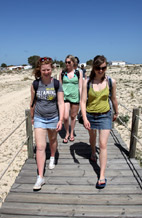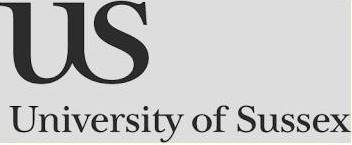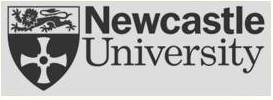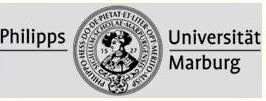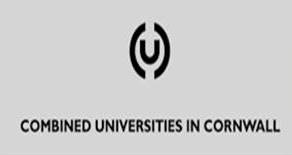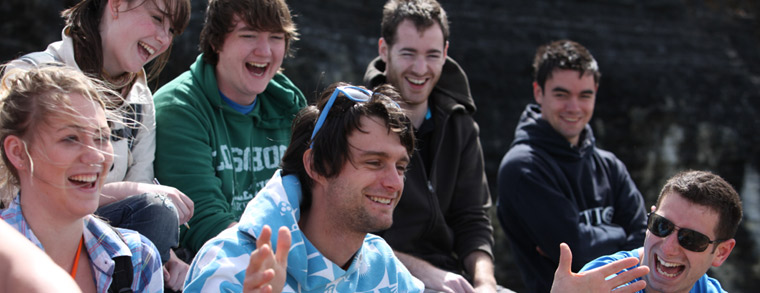sport sciences
activities for sport science courses
The Algarve has been asserting itself as the destination of choice for
warm-weather training for professional athletes and many national squads. The
west coast is the ideal region for outdoor sports all year round.
The rugged, sparsely populated terrain, panoramic scenery and pleasant
temperatures attract land-based disciplines, while warm water temperatures
(even in the winter) and the variety of the two coastlines suits water sport
enthusiasts. Consistent swell and a multitude of spots offer world class surfing
conditions that match that of anywhere in the world.
A field trip to the Algarve is a unique and effective way for
students to practise different sport disciplines while reinforcing social skills; like teamwork, commitment, leadership, and perseverance. Staying at our conservation centre encourages
studentâs relationship to the natural environment, their environmental
sensitivity and responsible outdoor behaviour through personal experiences.
for outdoor sports activities â
our offer
We assist lecturers in sport science to select training locations and design a bespoke
program to achieve module aims. We work
together with the trip leader in planning a cost effective, action filled training
week to meet specific course requirements. We arrange equipment rentals, guided tours and
lessons with our local partners. Our staff,
experienced in teaching Sport Science university courses, is available to provide an academically
rigorous framework for practical activities with theory sessions in the context
of science, conservation and sustainable tourism.Workshops are usually booked by groups staying at our field study centre. For information about prices go to page, for the CERES field trip core packet please go to page.
surfing
The south west Algarve, encompassing the extreme tip of continental Europe, combines
outstanding point, reef and beach breaks with consistent swell and shelter from
onshore wind thanks to west and south facing coastlines. With a bit of local knowledge you can surf
every day during autumn, winter and spring. While there are numerous world-class
locals and more and more visiting ASP pro-surfers, with local knowledge there are also plenty of
opportunities to find uncrowded breaks. It's a destination with waves for
every level. Experts can surf the famous
Arrifana point and Zavial for an unforgettable challenge. Beginners learn in warm, sunny 3ft beach
break on the south coast. To substantiate practical surf sessions we provide
surf-specific academic workshops in oceanography, meteorology, coastal
geomorphology, sedimentology, board building and coastal conservation.
Best time to go: September â June
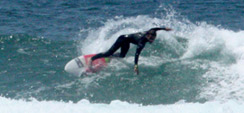 |
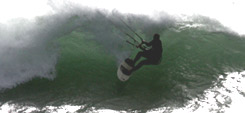 |
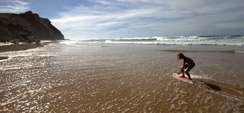 |
| Johnny at a clean day in Amoreira |
Axel having a kitesurf session at Alvor |
Maurice skimboarding in Clerigo |
kitesurfing / windsurfing / sailing
Wind sports in the western Algarve mean sun, warm water, uncrowded beaches,
beautiful scenery and the added bonus of year round wind. A reliable thermal Nortada during the summer months, reinforced by the local
topography in Sagres and Alvor, offers excellent flat water conditions. In winter low-pressures deliver strong southerly
winds and waves. Praia de Alvor, home to the PKRA World Tour, provides some of
the best settings to kite- and windsurf. The lagoon is protected from swell of
any direction and offers lots of space and shallow areas, perfect for
beginners. To augment a day on the water we can provide academic workshops in meteorology, oceanography, coastal
geomorphology, board building and coastal conservation.
Best time to go: May â August for flat water, November â April for waves
sea and river kayaking
The best conditions for kayaking can be found on the protected south coast and
on inland waters. The rivers and barragems of the Algarve are clean and full of wildlife. The journey down our local
Aljezur River or down the bigger Arade River near Portimao is a natural way to
be active and to learn about fluvial habitats at the same time. The rock and cave
formations around Lagos or the unspoilt, wild coast of the Parque Natural are the best places for
adventurous kayak trips. Kayak trips and sailing excursions can be combined with
workshops on limestone geology and karst development or limnetic ecology. To provide
a framework for practical sessions we can provide academic workshops in
meteorology, oceanography, coastal geomorphology, board building or coastal
conservation.
Best time to go: all year round except August
diving / snorkelling
With an excellent mix of the most diverse underwater wildlife in Europe,
interesting geological features and many wrecks to explore Portugalâs diving
has a lot to offer. Probably the best
place to experience scuba diving and snorkelling is off the south coast; the
water is crystal-clear and clean and the visibility under the water is remarkably
high. The most well-known spots for diving are the waters off Lagos and Sagres,
but all along the coast you will find a breath-taking array of marine life and
clearly marked archaeological remains from the Algarve's history. Our villa has a
large pool for basic training. The Aljezur
River estuary at high tide provides a safe and fun environment to learn the
first steps or to practice underwater sampling techniques. To support a
snorkelling or scuba diving activity booked with our partners we can provide
academic workshops in underwater sampling techniques, oceanography, coastal geomorphology or marine
conservation.
Best time to go: October â November and March â July
rock climbing
Most of our local rock climbing routes are situated near Bensafrim and Sagres
where there are mainly bolted routes but there is also plenty of trad for the
old school climbers. To introduce beginners
to the exciting world of rock climbing we recommend visiting Bensafrim. The
climbing there is safe top roping (grades 3-5). For the advanced climber the limestone cliffs around Cabo de São
Vicente are spectacular. They boast
some of the best rock climbing in Europe, from sport climbing and multi-pitch, to
deep water soloing, bouldering and adventure climbs (grades 3-8a). The south
facing ridges get plenty of sun, which makes them great winter spots. During summer early mornings and afternoons
offer shaded areas with pleasant breezes. A climbing day can be supported by contextualised
workshops in coastal geomorphology, sedimentology and sustainable tourism.
Best time to go: all year except August
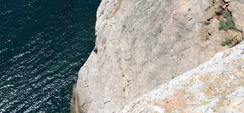 |
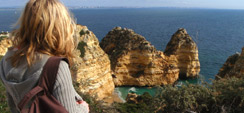 |
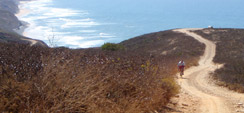 |
| Climbing in Sagres at a limestone cliff |
Hiking along the south coast |
Mountain biking along west coast dirt tracks |
hiking
Walking and hiking is very popular in the Algarve. There are walks on century
old donkey tracks through forests of cork oak, pine and eucalyptus and paths up
the mountains with spectacular views. The foot-path follows the coast line along empty beaches and coves. The
best time for a walking trip is from autumn through to spring as the summer
climate away from the coast is excessively hot. Some rainfall may be
experienced but it is rare for it to be prolonged. Nights can be cool and
sometimes on the chilly side with morning mists during the winter. Trails vary
in length from 2.5km to 17km, with a maximum ascent of 500m. The Algarve way is marked with the official
red and white bars denoting international long-distance pathways. A hiking day
can be contextualised by workshops in geomorphology, sedimentology and
sustainable tourism.
Best time to go: September â July
mountain biking / road cycling
The rugged terrain and open, undulating countryside is ideal for cross-country
and downhill mountain biking. There are various off-road trails starting right
at the CERES centre. You wonât need to follow any tarmac roads before entering
off-road tracks. You can ride the trails along the coast, enjoying spectacular sea views. The tracks are mostly dirt tracks with some tricky sandy
and rocky parts. Or you bike up to Monchique, the highest mountain range in the
Algarve and be rewarded with the breath-taking views and a challenging descend. We can arrange bike rentals and guided tours.
If you prefer to go out biking on your own, we are happy to assist you with expert
advice, maps and can recommend various routes, tailored to your ability. A cycling
day can be supported by workshops in geomorphology, sedimentology and
sustainable tourism.
Best time to go: all year except August
back

